Key takeaways:
- Small business grants are vital funding sources that require a compelling narrative and understanding of eligibility and application processes.
- Social innovation fosters collaboration, pushing businesses to create value beyond profit while addressing societal challenges.
- Networking and community engagement are essential strategies for discovering grant opportunities and enhancing applications.
- Resilience and adaptability in responding to feedback and aligning project goals with funder objectives can significantly improve grant application outcomes.
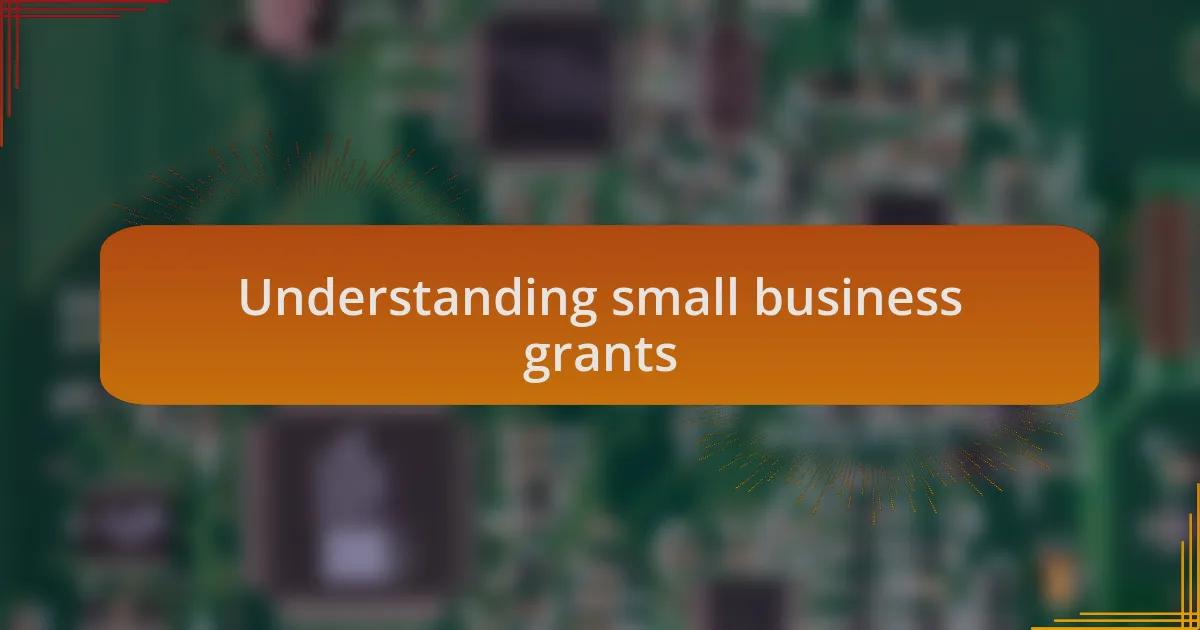
Understanding small business grants
Small business grants can feel like a treasure map — exciting yet daunting. When I first considered applying for a grant, I was overwhelmed by the variety of options available. Each grant comes with its own set of eligibility requirements and application processes. Have you ever thought about how spending time researching the different types of grants could influence your path to funding?
As I navigated through the grant landscape, I learned that these grants are essentially funds provided by governments, foundations, or private organizations that you don’t have to pay back. They can be used for various purposes like expansion, hiring, or technology upgrades. Knowing this transformed my perspective; I realized that I didn’t just need a good business plan, but also a compelling story to tell — one that would resonate with grantors.
The emotional weight of securing a grant is significant. I remember the anticipation and anxiety building up before I received the funding decision. It can feel like your dreams hang in the balance. Have you felt that pressure when seeking support for your own venture? Understanding that grants are not only financial support but also validation of your vision can make the process more worthwhile.
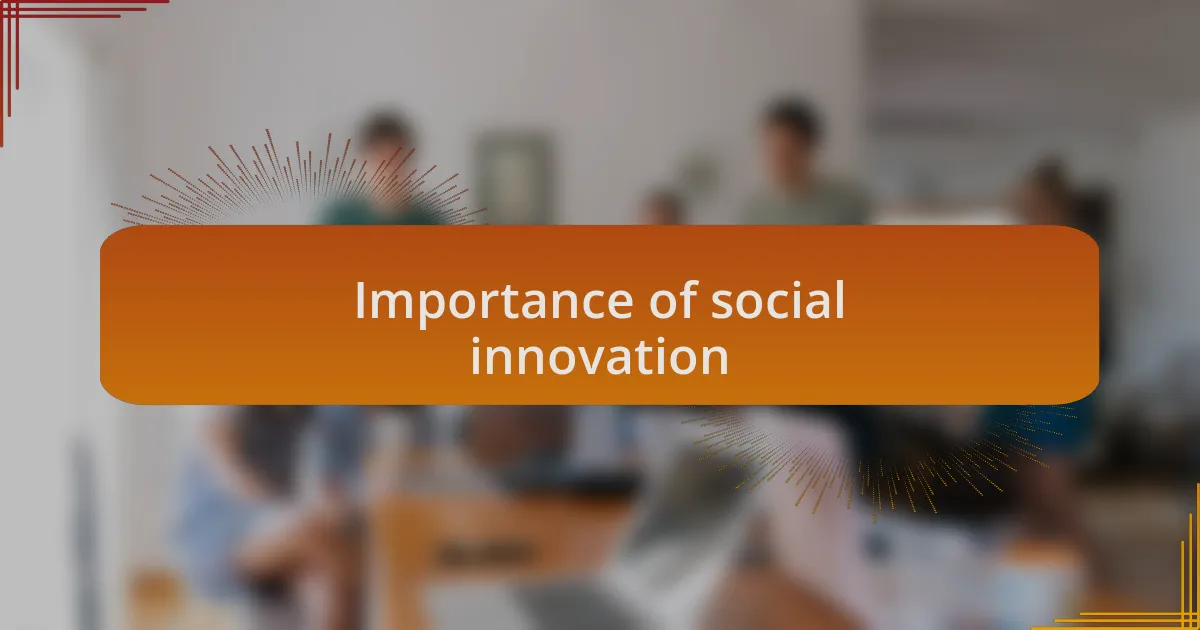
Importance of social innovation
Social innovation plays a crucial role in addressing societal challenges that often go overlooked. I remember a project I supported that aimed to improve waste management in urban areas. The innovative strategies developed not only reduced waste but also empowered communities to take ownership of their environment. Isn’t it fascinating how a creative solution can lead to significant positive change?
The impact of social innovation is far-reaching, fostering collaboration between various sectors. I often reflect on how partnerships forged in these initiatives not only enhance resources but also bring diverse perspectives to the table. Have you ever encountered a situation where teamwork led to a breakthrough? This synergy is vital for driving sustainable solutions and elevating the importance of collective action in our society.
Moreover, social innovation inspires individuals to rethink traditional business models, pushing them towards creating value beyond profit. I vividly recall a program I encountered where local artisans teamed up with tech innovators, creating products that celebrated cultural heritage while generating revenue. How inspiring is it to see entrepreneurship blend with social purpose? This shift in mindset can redefine success, emphasizing the importance of making a difference alongside financial gain.
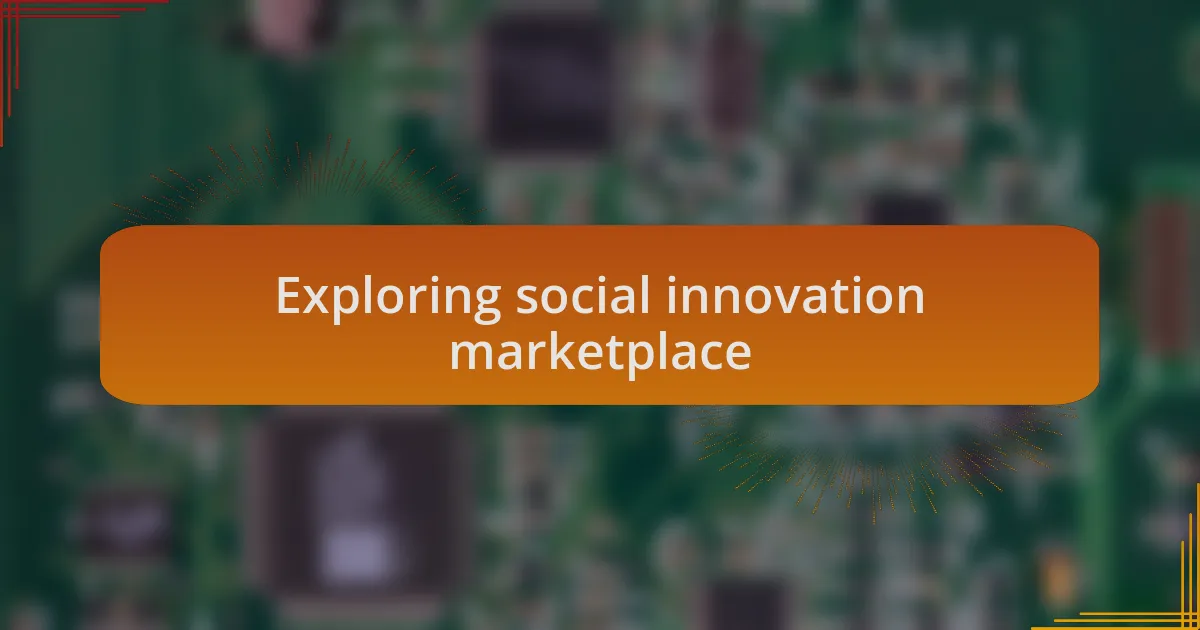
Exploring social innovation marketplace
Exploring the social innovation marketplace reveals a vibrant ecosystem where creativity meets a sense of purpose. I recall attending a local expo where entrepreneurs showcased their socially conscious products. It was eye-opening to realize how many people are dedicated to solving specific societal issues while thriving in their businesses. Have you ever felt that spark of inspiration when seeing someone merge passion with impact?
As I navigated through various booths, I noticed how these initiatives often rely on community engagement. One particular project caught my eye; it revolved around creating sustainable housing solutions for marginalized groups. This initiative didn’t just provide shelter; it fostered a sense of dignity and belonging. It made me ponder the ripple effect of such enterprises — how they can uplift entire communities.
Additionally, the social innovation marketplace fosters a unique environment where collaboration often outshines competition. During a panel discussion, I heard a founder share how sharing resources with other startups led to unexpected partnerships that amplified their impact. This reminded me of how collective wisdom can provide innovative answers to pressing problems, making me ask: what potential partnerships could we be missing in our own networks? It’s a powerful insight into the collaborative spirit that underscores this marketplace.
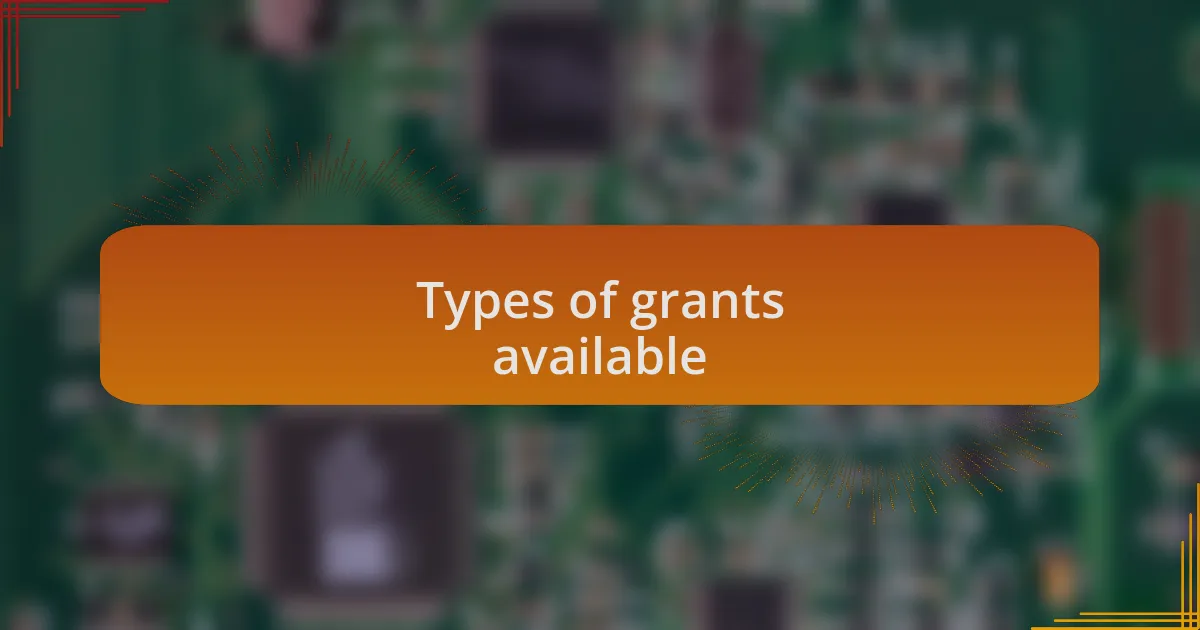
Types of grants available
When exploring the types of grants available for small businesses focused on social innovation, I often encounter a few key categories. For instance, government grants are a popular option, usually targeting specific sectors or demographics. I remember applying for a local government grant designed to promote eco-friendly initiatives. The application process felt daunting, yet the potential to secure funding for my project motivated me immensely.
Another type of grant often available is through non-profit organizations. These grants typically support specific causes, such as community development or health innovation. I once worked on a grassroots project that aimed to improve mental health resources in underprivileged areas. Securing a grant from a local non-profit not only provided much-needed funding but also validated our mission and efforts, pushing us to impact more lives.
Lastly, there are private foundations and corporate grants that can be incredibly beneficial. These often come with specific guidelines, but they frequently provide larger sums of money. I recall a particularly challenging moment when I learned that a corporation was seeking to fund ventures that directly addressed economic inequality. The competitive landscape was intimidating, but the thought of aligning my vision with a well-respected brand inspired me to put my best foot forward. Have you ever felt that rush when knowing you could be part of something bigger?
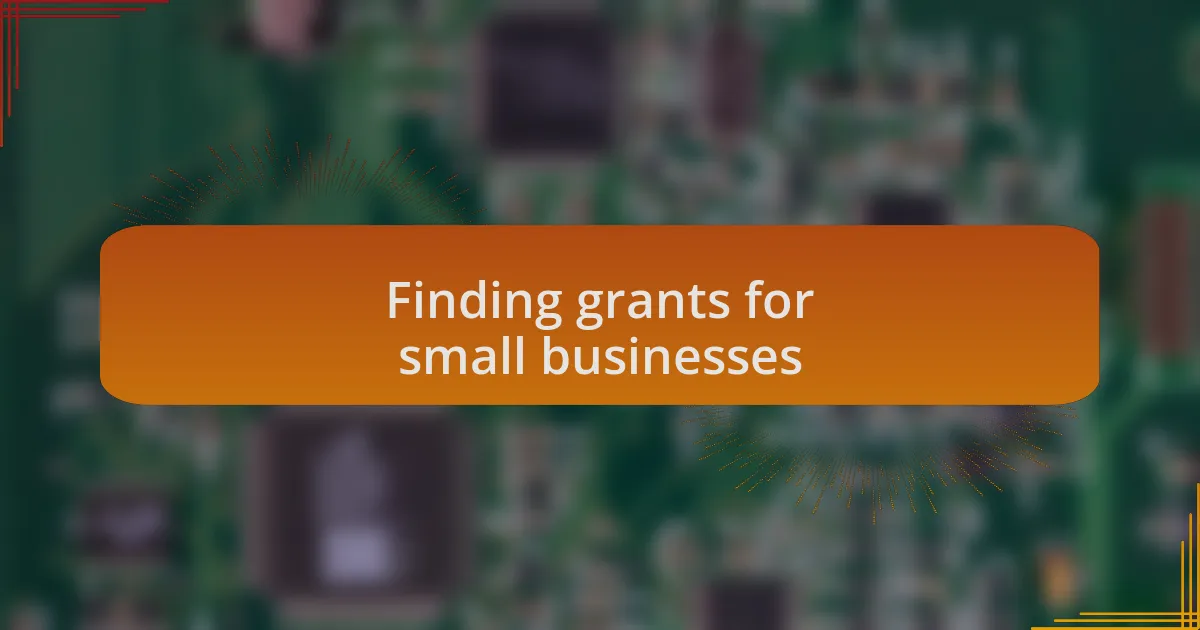
Finding grants for small businesses
Finding grants for small businesses can sometimes feel like navigating a maze. I vividly recall the first time I started searching for funding; it was overwhelming to sift through countless resources. One strategy that proved invaluable was joining local small business networks—connecting with others on the same journey shed light on hidden opportunities and strategies they had successfully employed.
Online databases are another amazing resource. I spent hours researching platforms like Grants.gov and the Foundation Center, which catalog a plethora of grant options. What surprised me the most was how often grants I thought were out of reach were actually designed for businesses that shared my values and goals. It’s empowering to realize that with a little perseverance and research, there are many tailored opportunities available.
Finally, don’t underestimate the power of social media and community groups. I remember seeing a Facebook post about this small business grant from a local entrepreneur association, which I likely would have missed otherwise. Engaging with these platforms not only keeps you informed but can also lead to unexpected connections and insights. Have you ever stumbled upon an opportunity just by being in the right online space?
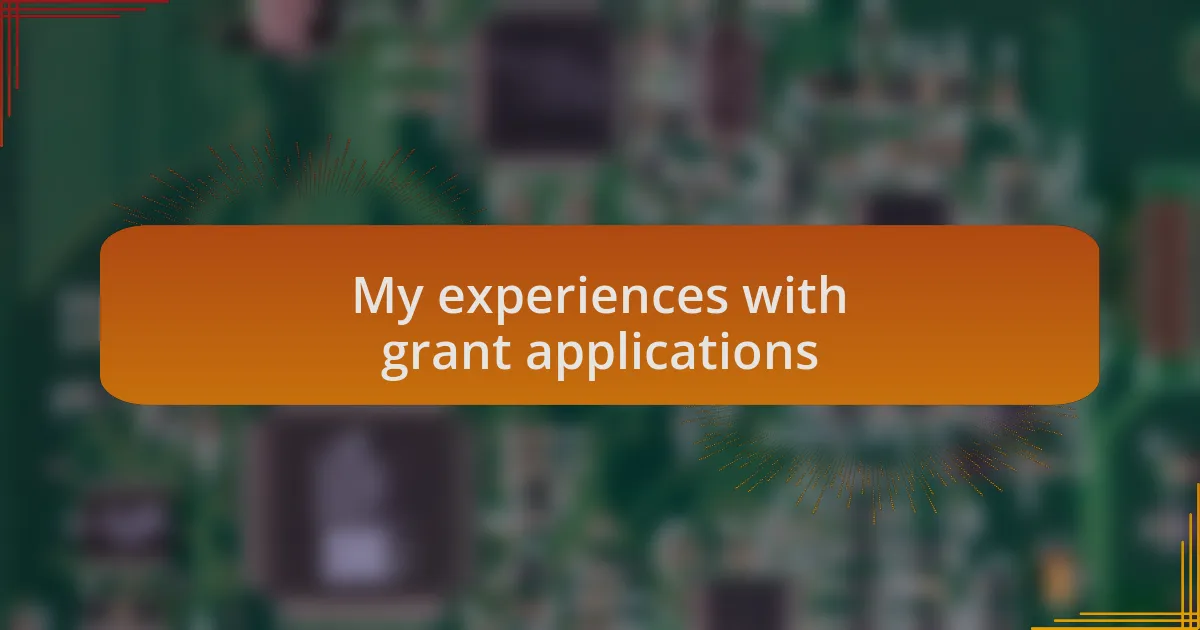
My experiences with grant applications
Applying for grants was a rollercoaster of emotions for me. I remember my first application felt like preparing for a big exam—I was excited yet terrified. Each section required meticulous attention, and I found myself questioning if I truly conveyed my vision and the impact my business could make. Have you ever had that nagging doubt creeping in as you hit “submit”?
As I navigated the application processes, I quickly learned that clarity and storytelling were key. One of my favorite moments was when I decided to share a personal story about how my business came to life. It resonated with the review panel, and I realized the power of vulnerability in making my application stand out. Have you considered how sharing your journey can create a genuine connection with grant reviewers?
There were definitely times when I faced rejection, which, I admit, stung quite a bit. However, each “no” became an opportunity for reflection. I began to ask myself what I could improve and how I could better align my goals with the grant’s objectives. This mindset shift transformed my experience—rather than seeing rejection as a dead end, I came to view it as a stepping stone toward eventual success. How do you handle setbacks in your own pursuits?

Lessons learned from my journey
Lessons learned from my journey
One of the most significant lessons I learned was the importance of building relationships in the grant community. Early on, I underestimated the power of networking. I vividly remember attending a local workshop and striking up a conversation with a seasoned grant writer. Her tips not only improved my applications but also led to valuable contacts that I later reached out to for feedback. Have you considered how a simple conversation could open new doors for you?
I also discovered that resilience was crucial in this journey. After a particularly harsh rejection, I was tempted to throw in the towel. Instead, I took a step back and reflected on what the feedback truly meant. It was through that painful process that I refined my approach. How often do we rush to abandon our dreams after setbacks? I learned that growth often lies just beyond our comfort zone.
The final takeaway was embracing adaptability. My initial ideas were often too rigid, expecting the grant criteria to fit my business model. However, I eventually learned to mold my vision to align with the funders’ goals. For instance, pivoting my project focus to address a current social issue not only enhanced my application but also broadened my impact. Have you thought about how adapting your vision can lead to unexpected opportunities?